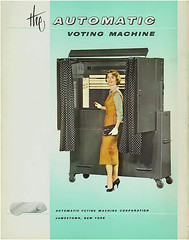 Image by R. Wahtera via Flickr
Image by R. Wahtera via Flickr
Challenges to second-home voters prolong House race count:
One factor that has not hindered the vote count is voting machine technology. The two commissioners agreed that the familiar, mechanical lever machines worked well during the March 31 election. Mr. Kline called them foolproof. Ms. Martin said they were completely reliable and functioned beautifully.
Asked whether the board had considered using the new electronic ballot marking voting machines for the special election, Mr. Kline said, “It would have been a nightmare. Every paper ballot might have been contested.”
Ms. Martin said that time did not permit using the new machines, and she said the cost to taxpayers of using them would have been considerable. Just licensing software for a one-candidate election would have cost up to $80,000, with ballots costing an additional $20,000, and that’s just the beginning. Prices for ongoing services from voting machine vendors will be going up soon, she said.
Both commissioners support a resolution adopted in January by the county Board of Supervisors asking the state for permission to retain the lever voting machines while augmenting them with the new, handicapped-accessible ballot marking devices that counties all over state were required to purchase last fall."
![Reblog this post [with Zemanta]](http://img.zemanta.com/reblog_e.png?x-id=2e5268b8-030a-4f6b-b9ae-7abfdc3e9f22)

![Reblog this post [with Zemanta]](http://img.zemanta.com/reblog_e.png?x-id=5782fcba-a903-4ad4-9ca8-1d89bf8aa113)


![Reblog this post [with Zemanta]](http://img.zemanta.com/reblog_e.png?x-id=f0cca0b2-d0ec-4219-accb-3ee1f9993401)

![Reblog this post [with Zemanta]](http://img.zemanta.com/reblog_e.png?x-id=1b01d472-e1d4-4e87-b140-00d6b4ce291e)

![Reblog this post [with Zemanta]](http://img.zemanta.com/reblog_e.png?x-id=b4a61433-c4cc-46f9-9f41-9c0fb34586f1)
![Reblog this post [with Zemanta]](http://img.zemanta.com/reblog_e.png?x-id=dbc59051-2f27-4696-a6b6-09ddf6d84501)



![Reblog this post [with Zemanta]](http://img.zemanta.com/reblog_e.png?x-id=d5274456-7e40-4e95-9c3c-ca3b8fefe835)

![Reblog this post [with Zemanta]](http://img.zemanta.com/reblog_e.png?x-id=9e9d5a5e-9c50-48ef-8075-58f37135354d)



